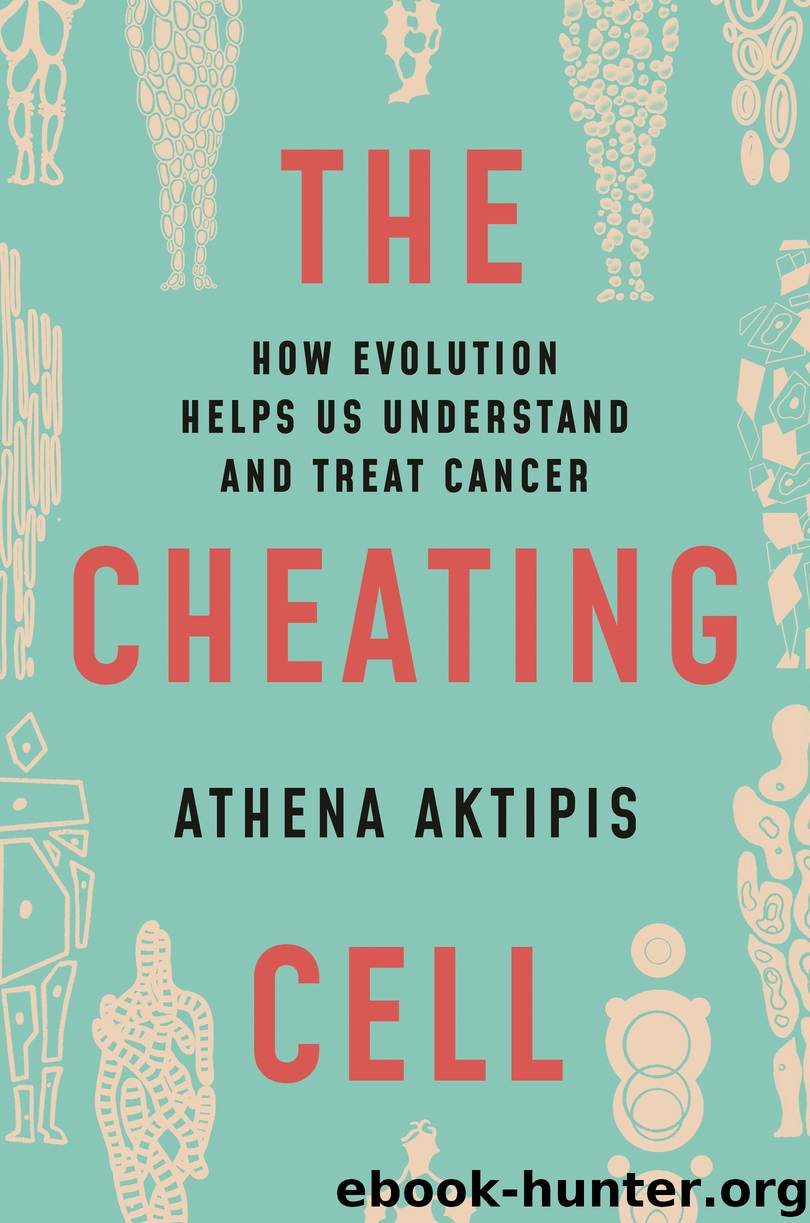The Cheating Cell by Athena Aktipis

Author:Athena Aktipis
Language: eng
Format: epub
Publisher: Princeton University Press
Published: 2019-12-20T00:00:00+00:00
Escaping from the Eco-pocalypse
The behavior of cancer cells can lead to a cellular tragedy of the commons. Cancer cells that replicate and use resources quickly have a short-term advantage over cells that are more restrained. Sometimes, cells that exploit their local environments will die, either because they have no resources left or because the amount of waste products around them overwhelms their ability to effectively detoxify. Other times, cells find a way out of this local ecological crisis, either by signaling for more resources, as we saw earlier, or by evolving to move and colonize new niches.
The core idea of dispersal theory in ecology is this: when organisms exploit their local environments, it can lead to selection for dispersal—for individuals that have the ability to move and find new environments to colonize. The very same principle applies in cancer evolution. When cells exploit their local environments, this leads to selection for cells that can move, and also for those that move more readily in response to poor ecological conditions.
My colleagues and I were inspired by this ecological principle and created a computer model of cancer cells to explore how the overuse of a resource might affect the evolution of cell mobility. Our computer model represented cancer cells living inside a simulated tissue with blood vessels delivering resources to them. In this model, there were cells that consumed resources quickly (like cancer cells do), and cells that consumed resources at a pace commensurate with the blood supply coming in (representing normal cells). We wanted to compare how cell mobility would evolve across these different conditions and see whether cells that consume resources quickly create ecological conditions that subsequently favor higher mobility and dispersal. As expected, we found that rapid resource use and environmental destruction by neoplastic cells drove the evolution of cell mobility. In accordance with dispersal theory, the high resource consumption of cancer cells leads to selection for cells that move.
Ecological dispersal theory has important implications for our understanding of invasion and metastasis. After invasion, and especially after metastasis, cancer is much harder to treat. Our model suggests that cells may evolve to move much earlier in progression than previously thought—long before invasion and metastasis are apparent. The model shows that cancer cells could evolve to move simply because they consume resources quickly and destroy their immediate environments. This is consistent with some curious facts about metastasis, like the fact that metastases often arise from cancer cells that left a tumor early in progression, in a process called “early dissemination.” This suggests that evolution of cell mobility may happen early in progression, even though the consequences of this cell mobility may not be apparent until after the tumor has invaded and metastasized.
Dispersal evolution and niche construction may seem like diametric opposites: dispersal evolution happens as a result of environmental destruction, niche construction is a process of environmental creation. But they actually go hand in hand: environmental destruction leads to selection for dispersal, but effective invasion and colonization of new environments requires active niche construction and cooperation among cancer cells.
Download
This site does not store any files on its server. We only index and link to content provided by other sites. Please contact the content providers to delete copyright contents if any and email us, we'll remove relevant links or contents immediately.
| Bone Cancer | Brain Cancer |
| Breast Cancer | Colorectal |
| Leukemia | Lung Cancer |
| Lymphatic | Prostate Disease |
| Skin Cancer |
Men In Love by Nancy Friday(5246)
Everything Happens for a Reason by Kate Bowler(4745)
The Immortal Life of Henrietta Lacks by Rebecca Skloot(4592)
Why We Sleep by Matthew Walker(4449)
The Sports Rules Book by Human Kinetics(4393)
Not a Diet Book by James Smith(3432)
The Emperor of All Maladies: A Biography of Cancer by Siddhartha Mukherjee(3164)
Sapiens and Homo Deus by Yuval Noah Harari(3078)
Day by Elie Wiesel(2786)
Angels in America by Tony Kushner(2662)
A Burst of Light by Audre Lorde(2611)
Endless Forms Most Beautiful by Sean B. Carroll(2485)
Hashimoto's Protocol by Izabella Wentz PharmD(2378)
Dirty Genes by Ben Lynch(2318)
Reservoir 13 by Jon McGregor(2306)
Wonder by R J Palacio(2212)
And the Band Played On by Randy Shilts(2211)
The Immune System Recovery Plan by Susan Blum(2059)
Stretching to Stay Young by Jessica Matthews(2045)
